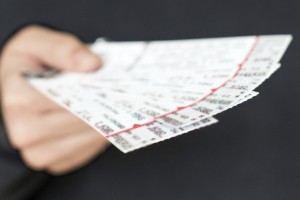There is a disturbing trend not only in sports, but with major event tickets – and the question of who owns the tickets you buy and who controls them. While you obviously believe that if you buy a ticket to a major sporting or entertainment event that you own that ticket, if you try to sell the ticket for any reason, the result might be a huge loss – or no sale at all. This is a sports ethics question.
 If a current New York State probe expands from sports to other events – as those conducting the investigation believe, it could find that hundreds of thousands, if not millions of dollars in losses have already been taken from customers.
If a current New York State probe expands from sports to other events – as those conducting the investigation believe, it could find that hundreds of thousands, if not millions of dollars in losses have already been taken from customers.
In an article entitled: “Official: NY investigators target NFL over ticket resale,” by Michael Virtanen for the Associated Press (January 29, 2016) we learn of an investigation to determine whether organizations such as the NFL, the New York Yankees and other Ticketmaster exchange programs could be setting artificial price floors.
In the case of the NFL, the article states:
“Many NFL teams encourage or even require ticket holders to use Ticketmaster’s NFL Ticket Exchange platform, where the seller is prohibited from cutting the price below face value. That prevents lower prices when demand drops, making it harder for season ticket holders to sell their tickets late in a season when their team is playing poorly.” From a sports ethics perspective is that right?
Though the NFL denies it is setting any price floors and that ticket holders are free to sell tickets on secondary ticketing sites, the article further states:
“While ticket holders can sell elsewhere, they are pushed toward the official ticket exchange platform. The report said it ‘is frequently billed as the official resale site and the only safe place to buy secondary NFL tickets.’”
The New York Yankees also states a similar position; ticket holders are free to sell their tickets anywhere they want, but the only safe place, they state is through the Yankees organization. This sets up an interesting sports ethics problem and may also constitute a legal problem.
Ticket demand
The face value for the purchase of any kind of ticket for any kind of event does not necessarily represent its inherent value. For example, suppose you are a ticket holder for a team that is absolutely the worst team in the league. The face value of your ticket might be $200.00 (for the sake of argument).
This coming weekend, your team is about to play the second-to-the-worst team in the league. For any number of reasons you cannot make the game and you try to sell it. You can sell it to Ticketmaster’s NFL Ticket Exchange platform where they will post it for $200.00 or more (it’s their discretion), but don’t be shocked if no one buys it. Most fans might buy it for $125.00 on another ticket exchange website (at least you would make something) but that’s another matter. In addition, at settlement you will lose 15% of the ticket price to the NFL for arranging the transaction.
Therefore, the NFL might overcharge the face price and if they find someone to buy it, and they will also take an additional percentage.
The fees they are taking is under the guise of safety for the ticket holder, but in steering you to sell your unused ticket on their site they are fully in control, you aren’t. They would just as soon be happy if you “officially” never sold it rather than finding an “unofficial” discounter who could sell it for you.
Think of a situation where you might be holding a season’s ticket to the symphony and the world-famous musician who was scheduled to perform must cancel. In addition, you have to cancel. You are informed that while you are free to sell the ticket anywhere, it is strongly recommended that the ticket should only be purchased through the official Ticketmaster website – and that you sell it to them. In addition, the Ticketmaster website broadly advertises to potential BUYERS that it is the only place they can be assured of getting an official ticket!
The Ticketmaster website insists on selling at full face-value and will charge you for doing it. Unfortunately, the replacement musician is mediocre and no one wants to buy the ticket.
The control issue
The two scenarios presented above are not far-fetched. In fact, it happens all of the time. Meanwhile, there are certainly other sources for tickets that are quite reputable and safe. The key difference is that they will discount the tickets to make them more attractive to buyers.
The ethics of who actually owns the tickets you buy is not an issue that is likely to go away without deeper investigation and regulation. Be aware that if you are tempted to sell your ticket through the “official” site, be it the NFL, MLB or any other organization, understand that the “safety” they talk about is theirs. They will make money from your situation, they will dictate how much you can charge and ultimately they will control the market they already own!
YOUR COMMENTS ARE WELCOME!


